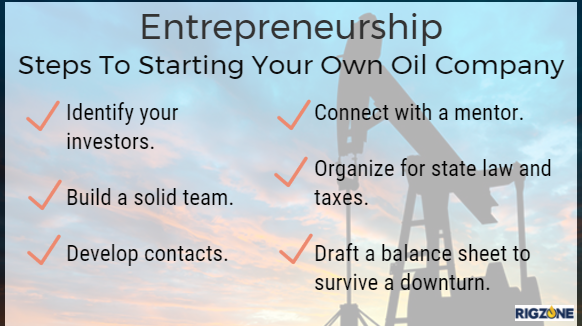So You Want To Start Your Own Oil Company
By : Deon Daugherty



Low interest rates. The promise of a friendlier regulatory environment. Billion-dollar private equity investors on the prowl. These factors are lining up to build a boom in oil and gas start-ups.
And with oil prices holding steady in the low $50s, now is a good time to get into the game, said Carl Larry, president of Oil Outlooks and Opinions LLC.
“This might be one of the most opportune times to take advantage of low interest rates in the foreseeable future. We know that rates are probably going to get higher by the end of the year and probably even higher than that over the next few years,” he said. “It’s an opportunistic time if you have the smarts to do it – if you understand what goes into it and around it.”
When the industry is booming with high oil prices, people probably leap without looking more often, said Michael Hurst, a partner at the Lynn Pinker Cox Hurst law firm.
“When prices are low, people are a lot more scrutinizing. And I think you’ve got – at this point in time – a lot more people that know what they’re doing, as opposed to people that just say, ‘Hey, oil prices are high, I want to get into the business.’”
Start-up Capital
But to get started, the upstream business requires a significant investment from the beginning.
“You don’t do it on a shoestring,” said John Ransom, a partner in the Houston office of Jackson Walker. “Tiny deals are $50 million. Small to medium deals are $100 to $300 million. Billion dollar deals are pretty typical.”
Once you start building capital, it becomes easier to obtain more, Larry said. In addition to angel funding and private equity, banks can be amenable to funding a start-up, especially in the Southwest where oil is a way of life.
“When you go to a community bank around Texas or Louisiana or Oklahoma, they understand what you’re trying to do. In a city like New York or Chicago, they understand restaurants or hotels,” Larry said. “But here in the Southwest, we understand when you’re talking about oil production.”
Building An A-Team
Putting the right team into place is crucial, Larry said, especially in the eyes of private equity lenders.
“The people you put together for these projects are more valuable than the money you can get,” Larry said. “Having people who have experience, the smarts and who understand technology, as well as people who understand the kind of drilling and/or operations that have to be built out around all of this – that’s number one.”
It doesn’t have to be a large team to be successful, he said. But your company will start with its people, and outside your company, solid industry contacts count in your success.
Mentors also matter.
“I think it’s also important to find a mentor – somebody that doesn’t work for you or with you that you can call upon and get good, sound advice,” Hurst said. “I’ve seen some of my entrepreneurial clients be very successful just by having the right mentors.”
As such, you need to know someone who understands the rules and regulations that dictate how things are done in oil and gas, Hurst said.
“It is a highly regulated industry,” Hurst said. “You need to be armed – this is where a private equity firm with a great track record can be helpful – because you need to have somebody on your team that knows how to navigate all of the rules.”
Regulatory Landscape
The timing has to be right from a regulatory standpoint. The new U.S. president has promised to rollback a variety of environmental regulations that industry leaders say slows progress.
“The regulatory landscape makes it really opportunistic,” Larry said. “As [the Trump Administration] rolls back a lot of these EPA regulations, and the Department of Energy starts to scale back, you might not have a window of opportunity this wide open for you to go out, do what you want to do and not have to worry about federal red tape.”
But even with the administration’s good will, you can’t escape federal taxes.
Once you’ve got a team, assets in sight and financial backing, it’s time to consider how you’ll organize for state law and tax purposes, Ransom said. The typical starting point is a limited liability company (LLC), which offers significant tax advantages both to the investors and those doing the work, providing the “sweat equity.”
Say you borrow $100 million in equity and the investor wants a 12 percent rate of return. Ransom said that typically, the clock starts ticking when you draw on the money, and “12 percent compounding gets to be a lot of money really fast.”
That often drives what your type of properties you want to drill. Horizontal wells can have incredible production spike, producing copious amounts of product in the first year and then flattening way down before they finally trickle along, Ransom said. An LLP can work well in that situation.
“They may be high-risk wells, but when they come in, gosh, you can get the investor’s money back to him, stop the running of that preferred return, and you, as the entrepreneur, are suddenly back in and can participate at a high rate,” he said.
Another tip from Ransom: craft a balance sheet to survive a downturn.
“It’s a big deal for folks, and the ones that survived the downturn have built fortress-styled balance sheets, and they’re now out gobbling up the guys who were weak,” he said.

Comments
Post a Comment